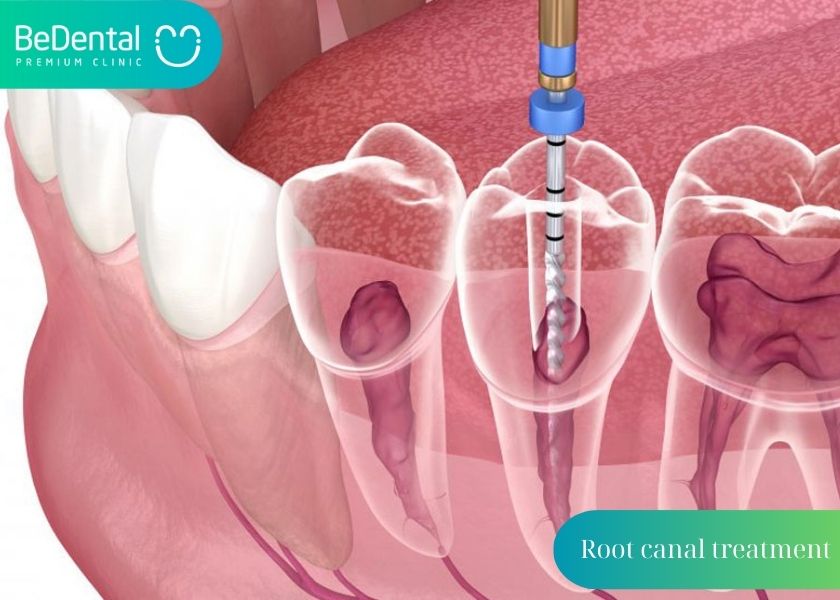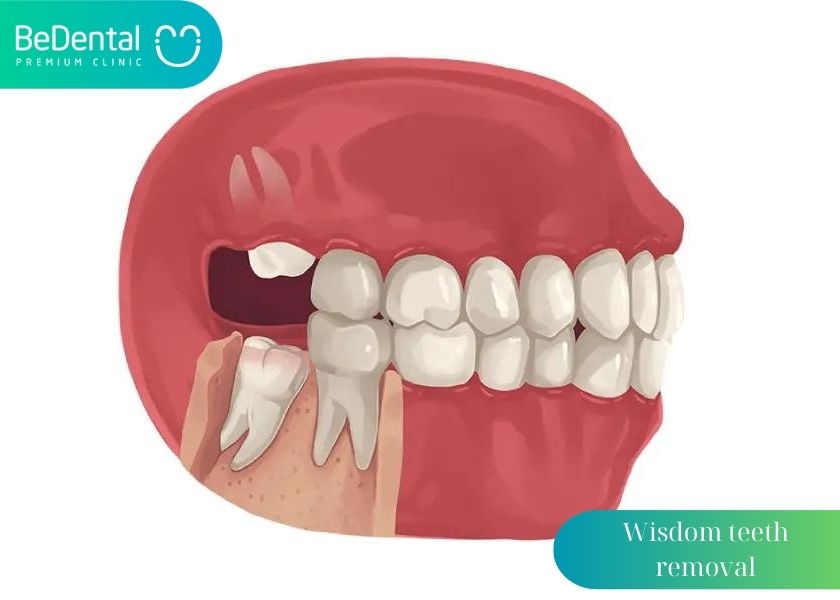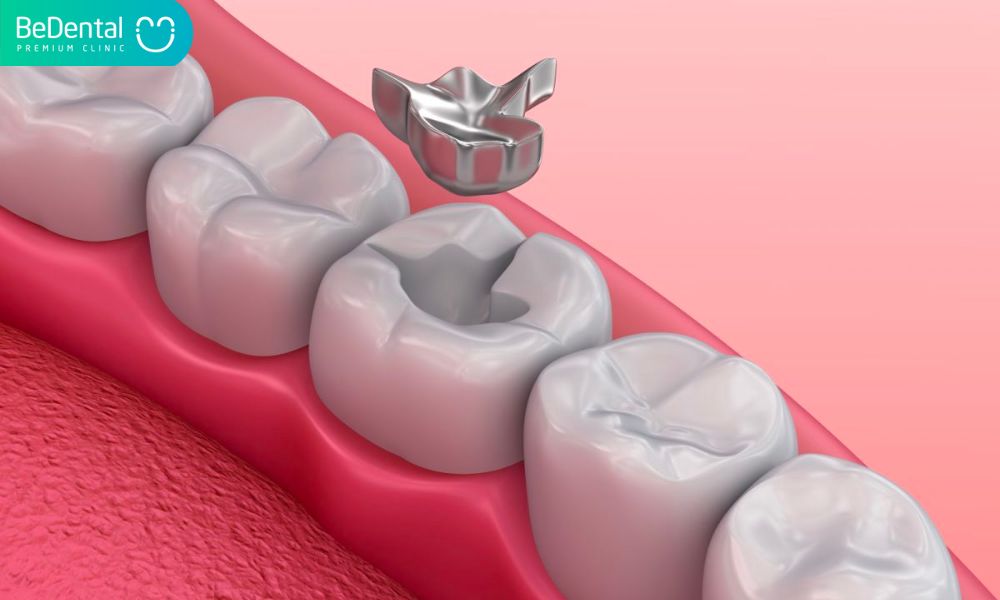More and more people are paying for brighter, whiter teeth. But What is teeth whitening? How Much Does Teeth Whitening Cost? Is teeth whitening safe? Let’s find out in this article!
What is Teeth Whitening?
Teeth whitening involves bleaching your teeth to make them lighter. It can’t make your teeth brilliant white, but it can lighten the existing colour by several shades.
Maybe you’ve always wanted a beautiful white smile. Or your teeth have yellowed over time. Or you’re not happy with the staining that results from drinking coffee, tea or cola. Whatever your reason for wanting whiter teeth, you’re not alone.
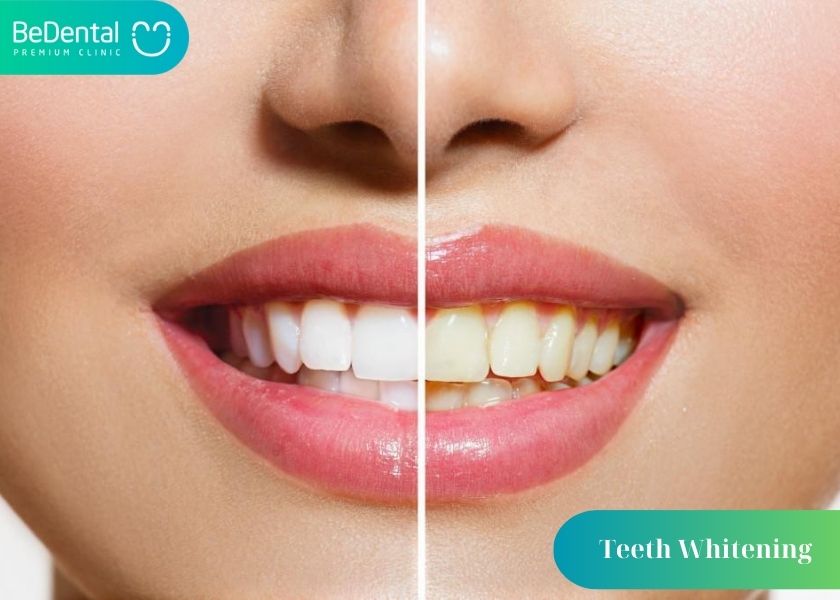
Just like we all have different hair and skin color, people also have different tooth color. Some teeth are more yellow than others, while others yellow with aging. There are many factors lead to tooth discoloration. That’s why we need teeth whitening to help you improve your teeth color.
What Causes Tooth Discoloration?
See more: Teeth bleaching: 4 ways to bleach teeth
Tooth color and age have a direct relationship. Teeth darken as a result of wear and tear and stain collection over time. Whitening will most likely produce immediate and dramatic outcomes in teenagers. When teeth begin to develop a yellow tinge in their twenties, teeth whitening may require a little more work. By the 1940s, the yellow has faded to brown, and additional upkeep may be required. The teeth had absorbed a variety of persistent stains by the 1950s, which can be difficult (but not impossible) to remove.
- Starting color: We all have a natural tooth color that varies from yellow-brownish to greenish-grey and darkens with age. Green-grey is more susceptible to bleaching than yellow-brown.
- Translucency and thinness are other inherited features that become more noticeable as you get older. While all teeth have some translucency, opaque and thick teeth offer an advantage: they appear lighter in color, have more sparkle, and are more bleachable. Teeth that are thinner and more translucent, particularly the front teeth, contain less of the pigment needed for teeth whitening. Transparency, according to cosmetic dentists, is the single issue that no amount of tooth whitening can fix.
- Intake habits: Regular consumption of red wine, coffee, tea, cola, carrots, oranges, and other dark-colored beverages and meals produces significant discoloration over time. Acidic foods, such citrus fruits and vinegar, also contribute to enamel loss. As a result, the surface becomes more translucent, revealing more yellow-colored dentin.
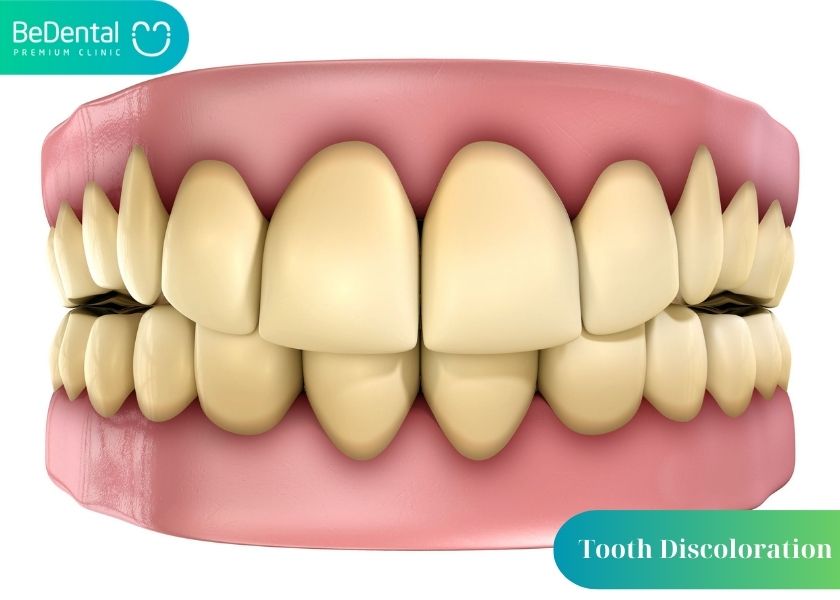
- Smoking causes brownish deposits to form on the teeth, which slowly seep into the structure and create intrinsic discoloration.
- Tetracycline use during tooth development causes dark grey or brown ribbon stains that are extremely difficult to remove. Fluorosis (discoloration defined by the formation of faint white markings on the teeth) and related areas of white mottling are caused by excessive fluoride ingestion.
- Grinding: Teeth grinding (gnashing, bruxing, etc.) can cause micro-cracking in the teeth and darken the biting edges. It is most commonly triggered by stress.
- Trauma: Falls and other accidents can cause huge gaps in the teeth, which trap a lot of bacteria and debris.
What Whitening Options Do You Have?
Today, there are three major teeth whitening alternatives. All three rely on different peroxide concentrations and application times.
See more: Teeth fluorosis: 4+ things you must know
Chairside Whitening/ In-office Teeth Whitening
The main advantage of in-office teeth whitening is the significant color change in a short amount of time. This procedure involves the dentist or trained technician applying a somewhat high-concentration peroxide gel to the teeth after the gums have been protected with a paint-on rubber dam. The peroxide is usually left on the teeth for 15 to 20 minutes at a time, totaling one hour (at most). Those with especially resistant stains may be recommended to return for one or more further bleaching treatments or to use a home-use method.
Cost: approximately 3.000.000 VND each visit (on average) across the country.
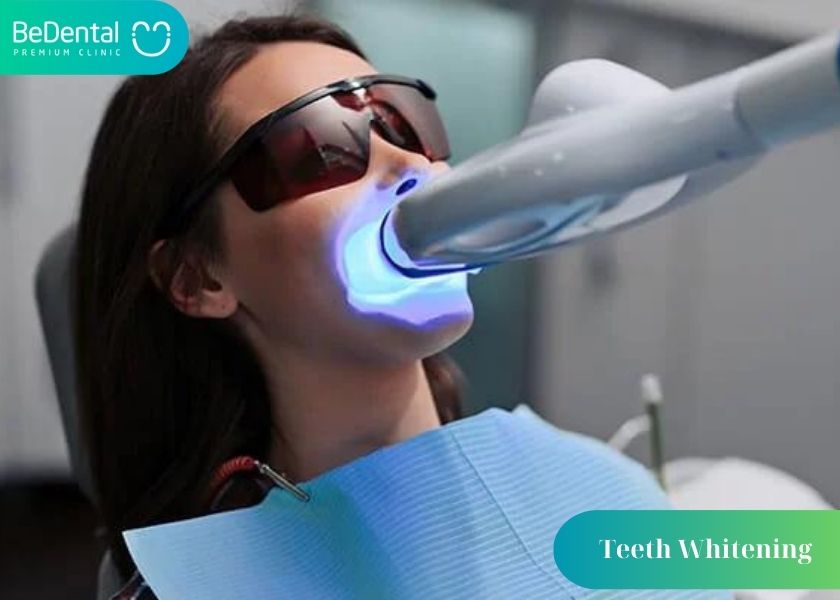
Take-Home Kits Dispensed by Professionals
Many dentists believe that properly administered take-home teeth whitening kits can provide the best long-term outcomes. Take-home kits include an easy-to-use peroxide gel with a lower concentration that stays on the teeth for an hour or more (sometimes overnight). The lesser the peroxide concentration, the longer it can stay on the teeth safely. Custom-made whitening trays that look like mouth guards are used to apply the gel to the teeth.
Cost: 900.000 VND to 1.500.000 VND.
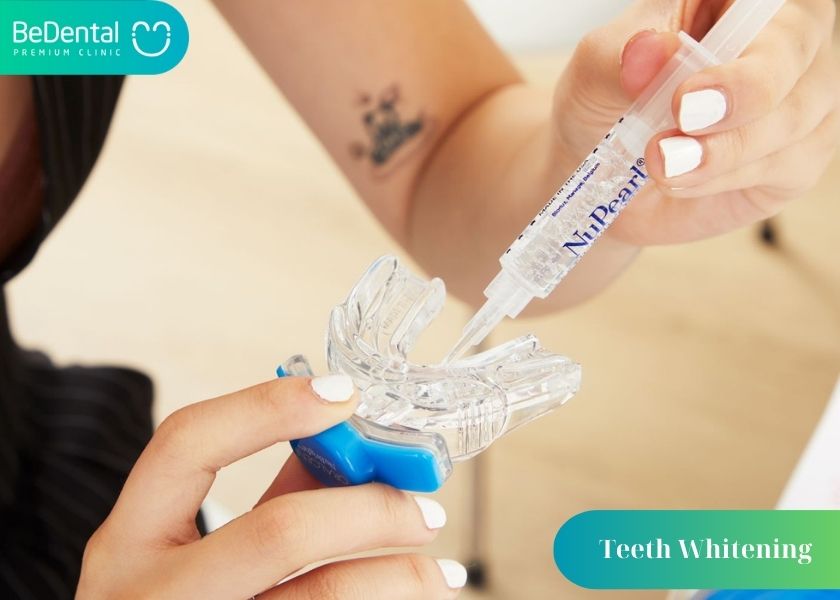
Over-the-counter Teeth Whitening Products
Over-the-counter bleaching is the cheapest and most convenient of the teeth whitening methods. It entails using a store-bought whitening kit with a bleaching gel that has a lower concentration than the professionally applied take-home whiteners. One-size-fits-all trays, strips, or paint-on applicators are used to apply the gel to the teeth. Unlike bespoke trays, which can whiten the complete smile, this may only whiten a few of the front teeth. The most popular option in Vietnam in recent days are the Crest 3D Whitestrips.
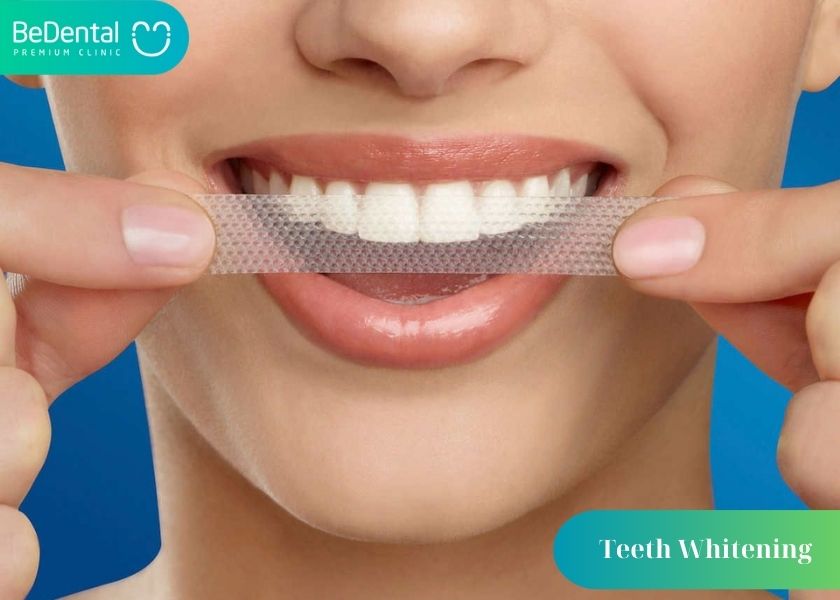
Cost: 60.000 VND to 700.000 VND.
How White Is Too White?
The outcomes are subjective and vary greatly from person to person. Many people are ecstatic with their results right away, while others may be dissatisfied. Before you start any teeth whitening treatment, talk to your dentist about what kind of results you may expect and how long it will take to get there.
Shade Charts
Before-and-after tooth color is often measured with shade guidelines in the dental office. These are portable screens that show a variety of tooth hues. (Dentists use them to select crown and other restoration colors.)
The standard-setter among them has long been the Vitapan Classic Shade Guide. This shade guide standard incorporates 16 shades, systematically arranged from light to dark into four color groups, and provides a universal tooth-color terminology.
While teeth whitening can occasionally lighten tooth color by nine or more shades, most of those who bleach their teeth are likely to see a change of two to seven shades.
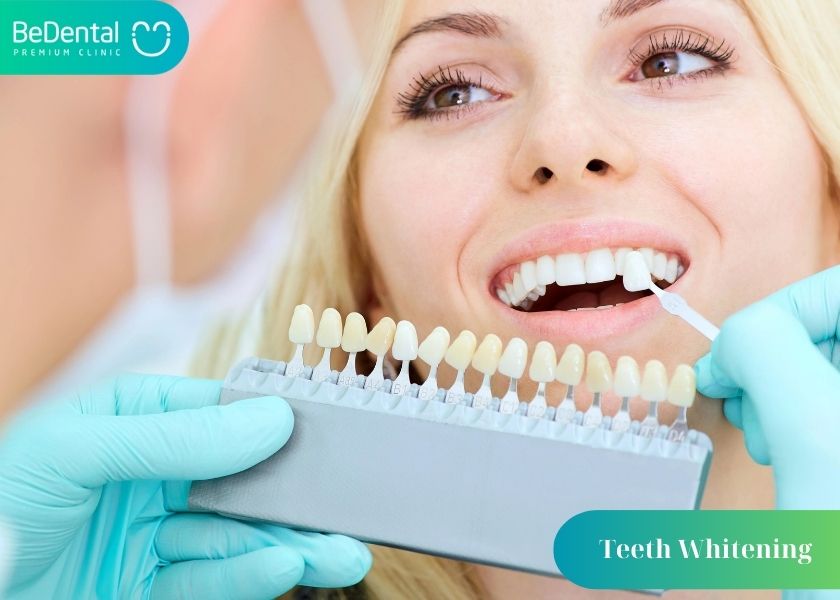
Risks
Teeth whitening treatments are considered to be safe when procedures are followed as directed. However, there are certain risks associated with bleaching that you should be aware of:
- Bleaching might make you more sensitive to temperature, pressure, and touch for a short time. This is most likely to happen during in-office teeth whitening, when stronger bleach is utilized. Some people have “zingers,” which are shooting pains along the middle of their front teeth. Those with gum recession, major fissures in their teeth, or leaks caused by poor restorations are at the most risk of whitening sensitivity. Redheads, even those with no other risk factors, have been observed to be more susceptible to dental sensitivity and zingers. Whitening sensitivity usually lasts a day or two, but it might last up to a month in extreme situations. For sensitive teeth, some dentists recommend potassium nitrate toothpaste.
See more: Cost of Zirconia crowns/veneers: Ranging between $800 and $1,500.
- Gum inflammation: More than half of those who use peroxide whiteners suffer from gum inflammation as a result of the bleach concentration or contact with the trays. The irritation usually lasts a few days and goes away if the bleaching is discontinued or the peroxide concentration is reduced.
- Restorations such as bonding, dental crowns, and veneers are unaffected by bleach, so they retain their natural color while the surrounding teeth are whitened. The outcome is a condition known as “technicolor teeth.”
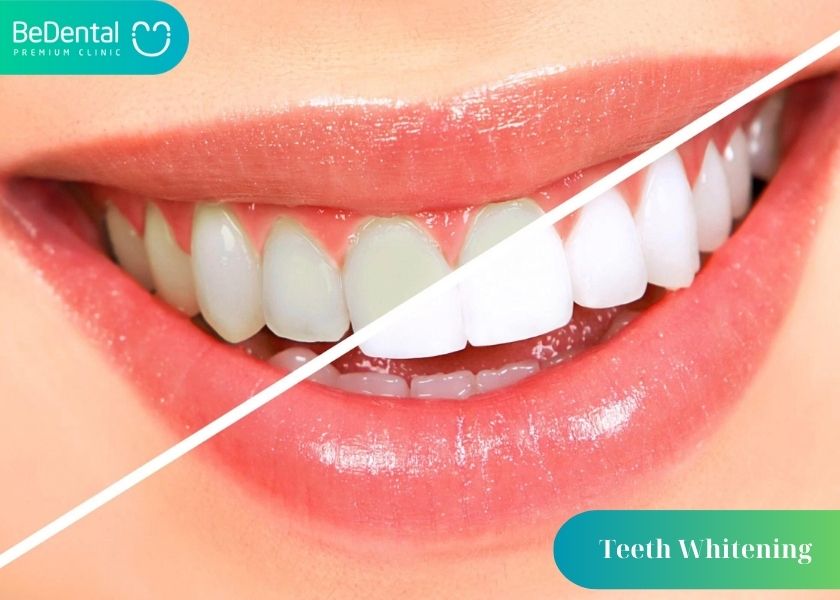
Keeping Your Progress
- Dentists are likely to recommend at-home follow-up or maintenance whitening to extend the life of newly whitened teeth. This can be done right away or as infrequently as once a year.
- After whitening, stay away from dark-colored meals and beverages for at least a week.
- Drink dark-colored liquids using a straw whenever possible.
- Brushing and flossing after meals and at bedtime to maintain good dental hygiene.
Is Teeth Whitening Safe?
Is Teeth Whitening Safe? No matter what treatment you use, there’s a chance your gums will be sensitive to the chemicals used in teeth whitening, particularly if you already have sensitive teeth. There’s also a chance of burns to gums and some of the whitening kits used at home can harm tooth enamel.
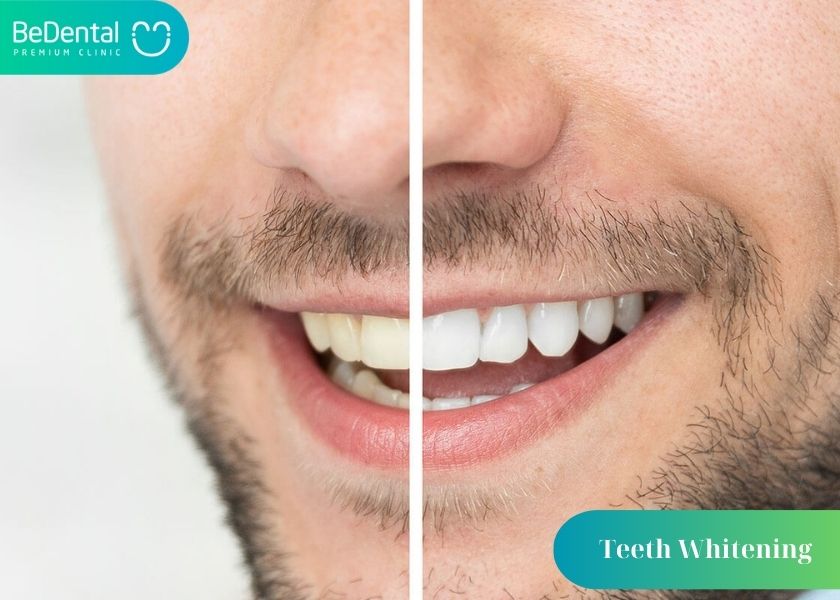
How Much Does Teeth Whitening Cost?
How Much Does Teeth Whitening Cost? Pricing might vary greatly depending on the product and process required.
The most expensive alternative is professional in-office teeth whitening (chairside whitening), which costs on average 3.000.000 VND per appointment (price can range from 2.000.000 VND to 3.500.000 VND). It does, however, have the advantage of being performed by an experienced dental practitioner, ensuring that you obtain the outcomes you want.
Over-the-counter strips and trays, which may be purchased at a local pharmacy or grocery shop, are at the opposite end of the expense spectrum. These products can cost anywhere from 60.000 VND to 700.000 VND, making them appealing to individuals searching for a little smile boost without the hefty cost of professional teeth whitening. However, while using these less expensive, low-concentration peroxide whiteners, take in mind that outcomes can vary dramatically.

You might be a suitable candidate for professionally dispensed take-home kits if you’re seeking for a medium ground between professional teeth whitening and over-the-counter treatments. These kits, which are prescribed by a dentist and range in price from $100 to $400, can potentially offer results identical to those obtained in-office by a dentist.
Keep in mind that whitening results aren’t permanent, so you’ll need to keep undergoing treatments when the effects wear off if you want to keep your white smile.
So, are you thinking of getting teeth whitening to brighten up a tarnished smile? The most common cosmetic dental procedure today is professional chairside whitening. In contrast to home-use products that use low-dose bleaching chemicals, chairside whitening takes place under closely regulated conditions, allowing for the safe, controlled, and pain-free application of a relatively high concentration of bleaching gel – with rapid results.
Here is Bedental’s price list for refer



